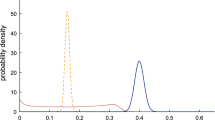Abstract
Scenarios are indispensable ingredients for the numerical solution of stochastic programs. Earlier approaches to optimal scenario generation and reduction are based on stability arguments involving distances of probability measures. In this paper we review those ideas and suggest to make use of stability estimates based only on problem specific data. For linear two-stage stochastic programs we show that the problem-based approach to optimal scenario generation can be reformulated as best approximation problem for the expected recourse function which in turn can be rewritten as a generalized semi-infinite program. We show that the latter is convex if either right-hand sides or costs are random and can be transformed into a semi-infinite program in a number of cases. We also consider problem-based optimal scenario reduction for two-stage models and optimal scenario generation for chance constrained programs. Finally, we discuss problem-based scenario generation for the classical newsvendor problem.
Similar content being viewed by others
References
Arya, V., Garg, N., Khandekar, R., Meyerson, A., Munagala, K., Pandit, V.: Local search heuristics for \(k\)-median and facility location problems. SIAM J. Comput. 33, 544–562 (2004)
Birge, J.R., Wets, R.J.-B.: Designing approximation schemes for stochastic optimization problems, in particular for stochastic programs with recourse. Math. Program. Study 27, 54–102 (1986)
Dick, J., Kuo, F.Y., Sloan, I.H.: High-dimensional integration—the Quasi-Monte Carlo way. Acta Numerica 22, 133–288 (2013)
Dohan, D., Karp, S., Matejek, B.: K-median algorithms: theory in practice. Working paper, Princeton, Computer Science (2015)
Dokov, S.P., Morton, D.P.: Second-order lower bounds on the expectation of a convex function. Math. Oper. Res. 30, 662–677 (2005)
Dudley, R.M.: The speed of mean Glivenko–Cantelli convergence. Ann. Math. Stat. 40, 40–50 (1969)
Dudley, R.M.: Real Analysis and Probability. Chapman & Hall, New York (1989)
Dupačová, J.: Scenario based stochastic programs: Strategies for deleting scenarios, IIASA Working Paper WP-95-014 (1995)
Dupačová, J., Consigli, G., Wallace, S.W.: Scenarios for multistage stochastic programs. Ann. Oper. Res. 100, 25–53 (2000)
Dupačová, J., Gröwe-Kuska, N., Römisch, W.: Scenario reduction in stochastic programming: an approach using probability metrics. Math. Program. 95, 493–511 (2003)
Edirisinghe, N.C.P.: New second-order bounds on the expectation of saddle functions with applications to stochastic linear programming. Oper. Res. 44, 909–922 (1996)
Edirisinghe, N.C.P., Ziemba, W.T.: Bounding the expectation of a saddle function with application to stochastic programming. Math. Oper. Res. 19, 314–340 (1994)
Feng, Y., Ryan, S.M.: Scenario construction and reduction applied to stochastic power generation planning. Comput. Oper. Res. 40, 9–23 (2013)
Frauendorfer, K.: Solving SLP recourse problems with arbitrary multivariate distributions—the dependent case. Math. Oper. Res. 13, 377–394 (1988)
Goberna, M.A., López, M.A.: Linear Semi-infinite Optimization. Wiley, Chichester (1998)
Graf, S., Luschgy, H.: Foundations of quantization for probability distributions. Lecture Notes in Mathematics, vol. 1730. Springer, Berlin (2000)
Guerra Vázquez, F., Rückmann, J.-J., Stein, O., Still, G.: Generalized semi-infinite programming: a tutorial. J. Comput. Appl. Math. 217, 394–419 (2008)
Heitsch, H., Römisch, W.: Scenario reduction algorithms in stochastic programming. Comput. Optim. Appl. 24, 187–206 (2003)
Heitsch, H., Römisch, W.: A note on scenario reduction for two-stage stochastic programs. Oper. Res. Lett. 35, 731–738 (2007)
Henrion, R., Küchler, C., Römisch, W.: Scenario reduction in stochastic programming with respect to discrepancy distances. Comput. Optim. Appl. 43, 67–93 (2009)
Henrion, R., Küchler, C., Römisch, W.: Discrepancy distances and scenario reduction in two-stage stochastic integer programming. J. Ind. Manag. Optim. 4, 363–384 (2008)
Hettich, R., Kortanek, K.O.: Semi-infinite programming: theory, methods, and applications. SIAM Rev. 35, 380–429 (1993)
Hettich, R., Zencke, P.: Numerische Methoden der Approximation und Semi-Infiniten Optimierung. Teubner, Stuttgart (1982)
Homem-de-Mello, T., Bayraksan, G.: Monte Carlo sampling-based methods for stochastic optimization. Surv. Oper. Res. Manag. Sci. 19, 56–85 (2014)
Kall, P.: Stochastic programming with recourse: upper bounds and moment problems. In: Guddat, J. (ed.) Advances in Mathematical Optimization, pp. 86–103. Akademie-Verlag, Berlin (1988)
Kall, P., Mayer, J.: Stochastic Linear Programming, 2nd edn. Springer, New York (2010)
Kariv, O., Hakimi, S.L.: An algorithmic approach to network location problems, II: the \(p\)-medians. SIAM J. Appl. Math. 37, 539–560 (1979)
Klatte, D.: A note on quantitative stability results in nonlinear optimization. In: Lommatzsch, K. (ed.) Proceedings of the 19. Jahrestagung Mathematical Optimization. Humboldt-Universität Berlin, Sektion Mathematik, Seminarbericht Nr. 90, pp. 77–86 (1987)
Leövey, H., Römisch, W.: Quasi-Monte Carlo methods for linear two-stage stochastic programming problems. Math. Program. 151, 315–345 (2015)
Li, S., Svensson, O.: Approximating \(k\)-median via pseudo-approximation. SIAM J. Comput. 45, 530–547 (2016)
Luedtke, J., Ahmed, S., Nemhauser, G.L.: An integer programming approach for linear programs with probabilistic constraints. Math. Program. 122, 247–272 (2010)
Morales, J.M., Pineda, S., Conejo, A.J., Carrion, M.: Scenario reduction for futures market trading in electricity markets. IEEE Trans. Power Syst. 24, 878–888 (2009)
Pagès, G.: A space vector quantization method for numerical integration. J. Comput. Appl. Math. 89, 1–38 (1997)
Pennanen, T., Koivu, M.: Epi-convergent discretizations of stochastic programs via integration quadratures. Numer. Math. 100, 141–163 (2005)
Pflug, G.C., Pichler, A.: Approximations for probability distributions and stochastic optimization problems. In: Bertocchi, M.I., Consigli, G., Dempster, M.A.H. (eds.) Stochastic Optimization Methods in Finance and Energy, pp. 343–387. Springer, New York (2011)
Rachev, S.T.: Probability Metrics and the Stability of Stochastic Models. Wiley, Hoboken (1991)
Rachev, S.T., Römisch, W.: Quantitative stability in stochastic programming: the method of probability metrics. Math. Oper. Res. 27, 792–818 (2002)
Rachev, S.T., Rüschendorf, L.: Mass Transportation Problems, vol. I. Springer, Berlin (1998)
Reemtsen, R.: Discretization methods for the solution of semi-infinite programming problems. J. Optim. Theory Appl. 71, 85–103 (1991)
Reemtsen, R., Görner, S.: Numerical methods for semi-infinite programming: a survey. In: Reemtsen, R., Rückmann, J.-J. (eds.) Semi-Infinite Programming, pp. 195–275. Kluwer, Boston (1998)
Robinson, S.M.: Regularity and stability for convex multivalued functions. Math. Oper. Res. 1, 130–143 (1976)
Rockafellar, R.T., Wets, R.J.-B.: Variational Analysis. Springer, Berlin (1998)
Römisch, W.: Stability of stochastic programming problems. In: Ruszczyński, A., Shapiro, A. (eds.)Stochastic Programming. Handbooks in Operations Research and Management Science, Volume 10, Elsevier, Amsterdam, pp. 483–554 (2003)
Römisch, W.: Scenario generation. In: Cochran, J.J. (ed.) Wiley Encyclopedia of Operations Research and Management Science. Wiley, New York (2010)
Römisch, W., Wets, R.J.-B.: Stability of \(\varepsilon \)-approximate solutions to convex stochastic programs. SIAM J. Optim. 18, 961–979 (2007)
Ruszczyński, A.: Probabilistic programming with discrete distributions and precedence constraints knapsack polyhedra. Math. Program. 93, 195–215 (2002)
Ruszczyński, A., Shapiro, A. (eds.): Stochastic Programming, Handbooks in Operations Research and Management Science, vol. 10. Elsevier, Amsterdam (2003)
Schwientek, J., Seidel, T., Küfer, K.-H.: A transformation-based discretization method for solving general semi-infinite optimization problems. Optim. Online Dig. (2017)
Shapiro, A., Dentcheva, D., Ruszczyński, A.: Lectures on Stochastic Programming, MPS-SIAM Series on Optimization, Second Edition, Philadelphia (2014)
Stein, O.: Bi-level Strategies in Semi-infinite Programming. Kluwer, Boston (2003)
Stein, O., Still, G.: On generalized semi-infinite optimization and bilevel optimization. Eur. J. Oper. Res. 142, 444–462 (2002)
Still, G.: Generalized semi-infinite programming: numerical aspects. Optimization 49, 223–242 (2001)
Vielma, J.P., Ahmed, S., Nemhauser, G.L.: Mixed-integer linear programming formulations for probabilistic constraints. Oper. Res. Lett. 40, 153–158 (2012)
Walkup, D., Wets, R.J.-B.: Lifting projections of convex polyhedra. Pac. J. Math. 28, 465–475 (1969)
Wets, R.J.-B.: Stochastic programs with fixed recourse: the equivalent deterministic program. SIAM Rev. 16, 309–339 (1974)
Zhao, M., Huang, K., Zeng, B.: A polyhedral study on chance constrained programs with random right-hand side. Math. Program. 166, 19–64 (2017)
Acknowledgements
The first author gratefully acknowledges support by the FMJH Program Gaspard Monge in optimization and operations research including support to this program by EDF. Both authors wish to thank the referees and the Guest Editor for their valuable comments.
Author information
Authors and Affiliations
Corresponding author
Additional information
Dedicated to the memory of Jitka Dupačová
Appendix
Appendix
We consider semi-infinite programs of the form
where \(U\subset \mathbb {R}^{m}\) is closed, \(V\subset \mathbb {R}^{k}\) is compact and the functions \(g_{0}:U\rightarrow \mathbb {R}\), \(g_{j}:U\times V\rightarrow \mathbb {R}\), \(j=1,\ldots ,p\), are continuous. Let \(V_{i}\), \(i\in \mathbb {N}_{0}\), be an increasing sequence of finite subsets of V such that \(\lim _{i\rightarrow \infty }\sup _{v\in V}\min _{v_{i}\in V_{i}}\Vert v-v_{i}\Vert =0\).
-
Discretization algorithm:
-
Step 0: Set \(i=0\), \(D_{0}=V_{0}\).
-
Step 1: Find a solution \(u_{i}\) of \(P[D_{i}]\).
-
Step 2: Find a solution \(v_{i}\) of \(\max _{v\in V_{i+1}} \max _{j=1,\ldots ,p}g_{j}(u_{i},v)\).
-
Step 3: If \(\gamma _{i}=\max _{j=1,\ldots ,p}g_{j}(u_{i},v_{i})>0\), then select a set \(D_{i+1}\) such that
$$\begin{aligned} D_{i}\cup \{v_{i}\}\subseteq D_{i+1}\subseteq V_{i+1}. \end{aligned}$$ -
Step 4: If \(\gamma _{i}\le 0\) then stop.
-
Step 5: Set \(i=i+1\) and go to Step 1.
If the feasible set F[V] of P[V] is nonempty and the level set \(\{u\in F[V_{0}]:g_{0}(u)\le g_{0}(u_{0})\}\) is bounded for some \(u_{0}\in F[V]\), the infima of \(P[D_{i}]\) converge to the infimum of P[V] and the sequence \((u_{i})\) has an accumulation point which solves P[V]. For a proof of this result we refer to [39, Theorem 2.1] and for further information and discussion to [40].
Rights and permissions
About this article
Cite this article
Henrion, R., Römisch, W. Problem-based optimal scenario generation and reduction in stochastic programming. Math. Program. 191, 183–205 (2022). https://doi.org/10.1007/s10107-018-1337-6
Received:
Accepted:
Published:
Issue Date:
DOI: https://doi.org/10.1007/s10107-018-1337-6




